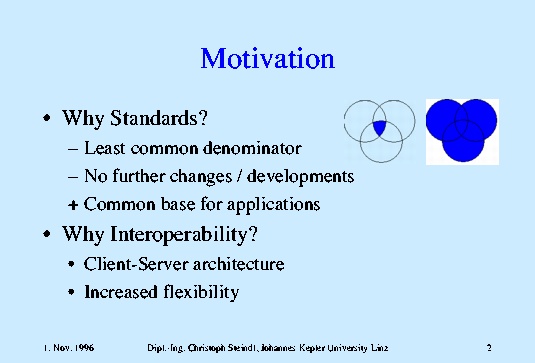Is Interoperability Achievable with ODBC?: Slide 2 of 10.
Click slide for next, or goto previous, first, last slides or back to thumbnail layout.

Click slide for next, or goto previous, or back to thumbnail layout.
First I will give a short motivation why we are looking forward to good standards and why interoperability might appeal to us.
The problem with standards is often that they denote a least common denominator of features. If there are three different companies working together to forma standard, chances are high that each of them wants to incorporate exactly his point of view into the standard. If they finally agree on a common standard, it will probably be the least common denominator including only the features that all companies can easily implement.
It is even worse if the standard finally comprises all features that one of the negotiators could imagine.
Once a standard has been established it is rarely changed so that the developments can stabilize. Major improvements often have to wait for years until a new version of the standard is released.
Nevertheless, standards are great for application developers because they can count on them and build on the defined (and implemented) interfaces.
Interoperability suggests that client applications can access databases without effort. Accessing and managing different databases become mere childïs play if the databases provide a standard interface for data definition and data manipulation.
This increase of flexibility will make it easier for application developers to rely on databases for data storage and retrieval. The advantages of databases will be exploited in quite a many of new applications.
